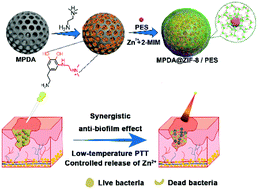Fabrication of a pH-responsive core–shell nanosystem with a low-temperature photothermal therapy effect for treating bacterial biofilm infection†
Abstract
Recently, photothermal therapy (PTT) has been recognized as a viable alternative strategy against bacterial biofilm infection. However, the hyperthermia required for PTT to ablate a biofilm usually induces damage in normal tissues/organs nearby. Herein, we developed zeolite-based imidazole framework (ZIF-8)-coated mesoporous polydopamine (MPDA) core–shell nanoparticles and then loaded Pifithrin-μ (PES), a natural inhibitor of heat-shock protein (HSP) that plays an essential role in bacteria resisting heating-induced damage. The ZIF-8 shell of the MPDA@ZIF-8/PES nanoplatform enabled a rapid degradation in response to the acidic environment in bacterial biofilm infection, which triggered the controlled release of PES and Zn ions. As a result, HSP was remarkably suppressed for enhancing PTT efficacy upon mild near-infrared light irradiation. In addition, the release of Zn2+ also had an antibacterial/antibiofilm effect. Thus, the fabricated nanosystem was able to induce the effective elimination of the bacterial biofilm, realizing low-temperature PTT (∼45 °C) with excellent antibacterial efficacy. This work presented here not only provides a facile approach to fabricate the MPDA@ZIF-8/PES nanosystem with the responsiveness of the bacterial infection environment, but also proposes a promising low-temperature PTT strategy to treat bacterial biofilm-infection effectively.



 Please wait while we load your content...
Please wait while we load your content...